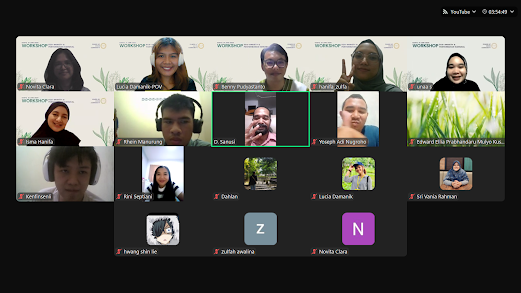POV Community Creates Safe Space for Eco-Anxiety and Ecological Healing
Saturday, June 21, 2025 – In Commemoration of World Environment Day
To mark World Environment Day, POV Community held a reflective workshop titled “Eco-Anxiety and Communal Healing” on Saturday, June 21, 2025. This event was designed as a safe and inclusive space for young people, grassroots communities, and individuals affected by ecological crises to explore the emotional toll of the climate crisis and engage with contextual, transformative approaches to collective healing.
The workshop was born out of the urgent need to address the psychosocial impact of environmental degradation—especially amidst the constant flood of information on natural disasters, environmental loss, land displacement, and extreme climate threats that provoke widespread anxiety, yet are rarely openly discussed.
Session I: Understanding Eco-Anxiety and Eco-Grief
Speaker: Stephanus Benny Pudyastanto, M.Psi., Psychologist
In the first session, psychologist Stephanus Benny Pudyastanto explored the phenomenon of eco-anxiety—a chronic fear of environmental catastrophe. Recognized by the American Psychiatric Association since 2017 as a chronic fear of environmental doom, eco-anxiety is often experienced by individuals who are aware of the climate crisis but lack a safe space to process the psychological burden.
Symptoms may include obsessive thoughts about ecological disasters, sleep disturbances, overwhelming guilt, and feelings of helplessness that can interfere with daily life.
Benny also explained the difference between eco-anxiety and eco-grief—the deep sorrow caused by actual ecological loss such as species extinction, landscape destruction, or the degradation of ancestral lands. Both, he emphasized, are valid responses to systemic breakdowns and must be met with empathy and collective awareness.
Participants were guided in reflecting on what they can and cannot control—a foundational step in building emotional resilience within limitation. Concrete actions included limiting exposure to distressing content, taking even the smallest steps toward climate action, nurturing supportive communities, practicing self-care, and seeking professional help when needed.
His key message: healing oneself is not an escape, but a courageous step toward facing uncertainty with wholeness and awareness.
Session II: From Systemic Crisis to Communal Action
Speaker: Isma Hanifa Ma’ruf, YPBB Indonesia
In the next session, Isma Hanifa Ma’ruf from YPBB Indonesia emphasized that the environmental crisis is not just driven by individual behavior, but by an exploitative, linear economic system. The current production cycle—extraction, manufacturing, distribution, consumption, and disposal—operates without ecological accountability, placing immense stress on the Earth’s carrying capacity.
Isma stressed that overconsumption, including digital consumption such as constant gadget use, unnecessary data storage, and inefficient urban lighting, contributes significantly to carbon emissions. Simple habits like deleting unnecessary emails, turning on flight mode, or using energy-saving lights can become part of collective efforts to reduce our carbon footprint.
In the context of energy, participants were introduced to the concepts of conservation and efficiency. Conservation emphasizes behavioral change to reduce energy use, while efficiency focuses on using technology that consumes less power. According to Isma, both approaches must go hand in hand as part of a just transition toward sustainability.
Waste was also a major discussion point. Organic waste in Indonesian landfills produces methane (CH₄)—a greenhouse gas 25 times more potent than CO₂. Unfortunately, many landfills lack gas capture systems, and incinerators often generate secondary pollution such as dioxins.
Isma emphasized that sustainable solutions lie not in burning waste, but in reducing waste at the source, promoting household- or community-scale composting, and implementing citizen-driven waste management. The zero waste approach was framed as a bridge between environmental stewardship and social healing.
Relaxation Session: Hypnotherapy & Self-Recovery Techniques
To support the healing process, participants joined a light hypnotherapy session facilitated by psychologist Benny. The session introduced basic tools for relaxation, conscious breathing, and psychosomatic recovery.
Participants could choose to actively engage or simply observe. It was emphasized that the session was not intended as intensive professional therapy, but as a supportive space to reduce mental tension triggered by climate stress.
Participant Reflections: Voices from a Healing Space
The workshop left a deep impression on many attendees. Participant Yoseph Adi Nugroho shared:
“The breakout sharing sessions helped us connect and exchange our personal stories, complemented by eye-opening insights from Kak Benny and Kak Isma. This workshop made me want to get more involved and move together with the community. I realized that change must start with ourselves, so we can inspire others to care about the environment—because if not us, then who? It's all for the sake of future generations.”
Another participant highlighted the emotional depth of the third session:
“What stood out the most for me was the third session, where we were guided through steps to regain control of ourselves. It felt like being led back into our own bodies—calm, aware, and present.”
These reflections show that the workshop became more than a space for learning. It became a place of return—a communal home where young people could feel seen, heard, and empowered to face the climate crisis together.
Closing & Recommendations from POV Community
The workshop concluded with small group reflections, where participants shared their fears, hopes, and personal stories. Through collective affirmation and solidarity, many came to realize that healing ourselves and healing the Earth are inseparable processes.
"Healing cannot be done alone. In the midst of fear and exhaustion, community is both home and a source of power for change."
— Lucia Damanik, Founder of POV Community
POV Community’s Recommendations:
-
Make self-care an integral part of environmental activism.
-
Build communities grounded in trust and shared learning.
-
Promote local energy transitions and community-based waste management.
-
Watch the documentary “The Story of Stuff” to deepen your understanding of global production systems and the urgency of structural change.
About POV Community
POV Community is a safe space led by young women that supports critical learning, self-care, and collective action across grassroots communities. We uplift marginalized voices in environmental and mental health issues while promoting sustainability that is contextual and rooted in social justice.
Contact & Collaboration:
Instagram: @pov.project.id




Tidak ada komentar:
Posting Komentar